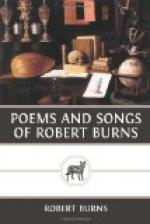At length his lonely
cot appears in view,
Beneath the shelter
of an aged tree;
Th’ expectant
wee-things, toddlin, stacher through
To meet their dead,
wi’ flichterin noise and glee.
His wee bit ingle, blinkin
bonilie,
His clean hearth-stane,
his thrifty wifie’s smile,
The lisping infant,
prattling on his knee,
Does a’ his weary
kiaugh and care beguile,
And makes him quite
forget his labour and his toil.
Belyve, the elder bairns
come drapping in,
At service out, amang
the farmers roun’;
Some ca’ the pleugh,
some herd, some tentie rin
A cannie errand to a
neibor town:
Their eldest hope, their
Jenny, woman-grown,
In youthfu’ bloom-love
sparkling in her e’e—
Comes hame, perhaps
to shew a braw new gown,
Or deposite her sair-won
penny-fee,
To help her parents
dear, if they in hardship be.
With joy unfeign’d,
brothers and sisters meet,
And each for other’s
weelfare kindly speirs:
The social hours, swift-wing’d,
unnotic’d fleet:
Each tells the uncos
that he sees or hears.
The parents, partial,
eye their hopeful years;
Anticipation forward
points the view;
The mother, wi’
her needle and her shears,
Gars auld claes look
amaist as weel’s the new;
The father mixes a’
wi’ admonition due.
Their master’s
and their mistress’ command,
The younkers a’
are warned to obey;
And mind their labours
wi’ an eydent hand,
And ne’er, tho’
out o’ sight, to jauk or play;
“And O! be sure
to fear the Lord alway,
And mind your duty,
duly, morn and night;
Lest in temptation’s
path ye gang astray,
Implore His counsel
and assisting might:
They never sought in
vain that sought the Lord aright.”
But hark! a rap comes
gently to the door;
Jenny, wha kens the
meaning o’ the same,
Tells how a neibor lad
came o’er the moor,
To do some errands,
and convoy her hame.
The wily mother sees
the conscious flame
Sparkle in Jenny’s
e’e, and flush her cheek;
With heart-struck anxious
care, enquires his name,
While Jenny hafflins
is afraid to speak;
Weel-pleased the mother
hears, it’s nae wild, worthless rake.
Wi’ kindly welcome,
Jenny brings him ben;
A strappin youth, he
takes the mother’s eye;
Blythe Jenny sees the
visit’s no ill ta’en;
The father cracks of
horses, pleughs, and kye.
The youngster’s
artless heart o’erflows wi’ joy,
But blate an’
laithfu’, scarce can weel behave;
The mother, wi’
a woman’s wiles, can spy
What makes the youth
sae bashfu’ and sae grave,
Weel-pleas’d to
think her bairn’s respected like the lave.




